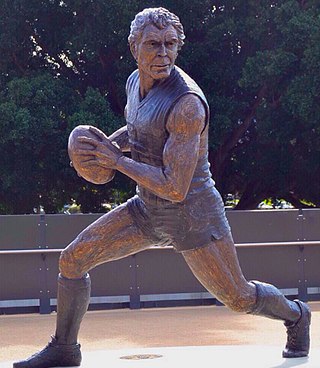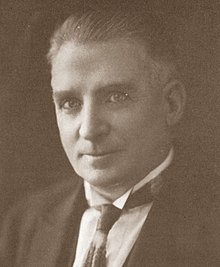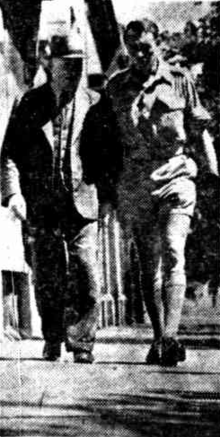
Port Adelaide Football Club is a professional Australian rules football club based in Alberton, South Australia. The club's senior men's team plays in the Australian Football League (AFL), where they are nicknamed the Power, while its reserves men's team competes in the South Australian National Football League (SANFL), where they are nicknamed the Magpies. Since its founding, the club has won an unequalled 36 SANFL premierships and 4 Championship of Australia titles, in addition to an AFL Premiership in 2004. It has also fielded a women's team in the AFL Women's (AFLW) league since 2022 (S7).

Russell Frank Ebert was an Australian rules footballer and coach. He is considered one of the greatest players in the history of Australian rules football in South Australia. Ebert is the only player to have won four Magarey Medals, which are awarded to the best and fairest player in the South Australian National Football League (SANFL). He is one of four Australian rules footballers to have a statue at Adelaide Oval, the others being Ken Farmer, Malcolm Blight and Barrie Robran. Football historian John Devaney described Ebert as coming "as close as any player in history to exhibiting complete mastery over all the essential skills of the game," and he is widely regarded as the Port Adelaide Football Club's greatest-ever player. Aside from his 392 games at Port Adelaide, Ebert played 25 games for North Melbourne in the 1979 VFL season and collected over 500 possessions as a midfielder for the club, which reached the preliminary final. Ebert was an inaugural inductee into the Australian Football Hall of Fame in 1996, and he was posthumously elevated to Legend status in June 2022, the highest honour that can be bestowed onto an Australian footballer.

Prince Alfred College is a private, independent, day and boarding school for boys, located on Dequetteville Terrace, Kent Town – near the centre of Adelaide, South Australia. Prince Alfred College was established in 1869 by the Methodist Church of Australasia, which amalgamated with other Protestant churches in 1977 to form the Uniting Church in Australia.

The Showdown is an Australian rules football game played by the two Australian Football League (AFL) teams from South Australia, the Adelaide and Port Adelaide football clubs. The first AFL premiership fixture between the two clubs took place on 20 April 1997.
The John Cahill Medal, named after the Port Adelaide Football Club's ten time premiership coach and inaugural AFL coach John Cahill, is awarded to the club player adjudged best and fairest for the season. The voting system as of the 2017 AFL season, consists of each member of the coaching committee giving each player a ranking from zero to five after each match.

Alberton Oval is a sports oval located in Alberton, a north-western suburb of Adelaide, South Australia. It has been the home of the Port Adelaide Football Club since 1880. The ground is a public park and is exclusively leased to Port Adelaide for Australian rules football.

Robert Berrima Quinn MM was a champion Australian rules footballer with the Port Adelaide Football Club in the South Australian National Football League (SANFL), and a decorated soldier of the Second World War.

Timothy Ginever is a former Australian rules footballer in the South Australian National Football League (SANFL), playing for Port Adelaide.
The North Adelaide District Football Association (NADFA) was an Australian rules football competition based in the northern and north-eastern suburbs of Adelaide, South Australia until it merged with the East Torrens Football Association to form the Norwood-North Football Association at the end of the 1968 season. It was formed in 1921 under the patronage of the North Adelaide Football Club with complete control over its own affairs.

Kooyonga Golf Club is a private golf club in Australia, located in South Australia at Lockleys, a suburb west of Adelaide. Members entry is off May Terrace, Brooklyn Park.

William Harold Oliver was an Australian rules footballer. Harold Oliver was a key player to some of South Australian football's most successful teams. He starred in South Australia's victorious 1911 Australian football championship along with Port Adelaide's 1914 "Invincibles" team. After being close to retiring from the game after World War I, he returned to captain both Port Adelaide to the 1921 SAFL premiership and South Australia in a game against Western Australia. His reputation as an early exponent of the spectacular mark—along with his general skill at playing the game—saw him regarded as one of the best players South Australia has produced.

Henry "Tick" Phillips was an Australian footballer and champion player for Port Adelaide. He is widely considered to be the club's greatest player of the nineteenth century. Phillips played sixteen seasons for Port Adelaide. For his final two seasons, he was appointed captain.
The history of Port Adelaide Football Club dates back to its founding on 12 May 1870. Since the club's first game on 24 May 1870, it has won 36 SANFL premierships, including six in a row. The club also won the Champions of Australia competition on a record four occasions.

The Gawler Football Club was an Australian rules football club that was founded in June 1868 based at Gawler in the Township of Gawler about 39 km to the north-north east of Adelaide, South Australia.
The Tomkins Medal was an Australian rules football honour awarded from 1939 to 2008 to the fairest and most brilliant player in the South Australian National Football League (SANFL) under-19 competition, as judged by field umpires. It was named after Horace W. (Dick) Tomkins, past League administrator, League life member, junior football ambassador and Secretary of the West Torrens Football Club. From 1936 to 1938, the award was known as the O'Halloran Medal.
The McCallum Medal was an Australian rules football honour awarded from 1947 to 2008 to the fairest and most brilliant player in the South Australian National Football League (SANFL) U/17 competition, as judged by field umpires. It was named after Frederick John McCallum, League life member and past Secretary of the Norwood Football Club. From 1939-1941 the award was known as the O'Halloran Medal, named after Thomas Shuldham O'Halloran KC, a former chairman of the League.

Horace Victor Pope was an Australian rules footballer who played for Port Adelaide. He captained the club in the second half of 1919.
Kane Farrell is a professional Australian rules footballer playing for Port Adelaide in the Australian Football League (AFL). He made his debut in round 19 of the 2018 AFL season against the Western Bulldogs at Eureka Stadium, kicking one goal.

Port Adelaide Football Club (AFL Women's) is a professional Australian rules football team based in Alberton, South Australia. The team plays in the AFL Women's (AFLW) competition. The team is part of the Port Adelaide Football Club.













